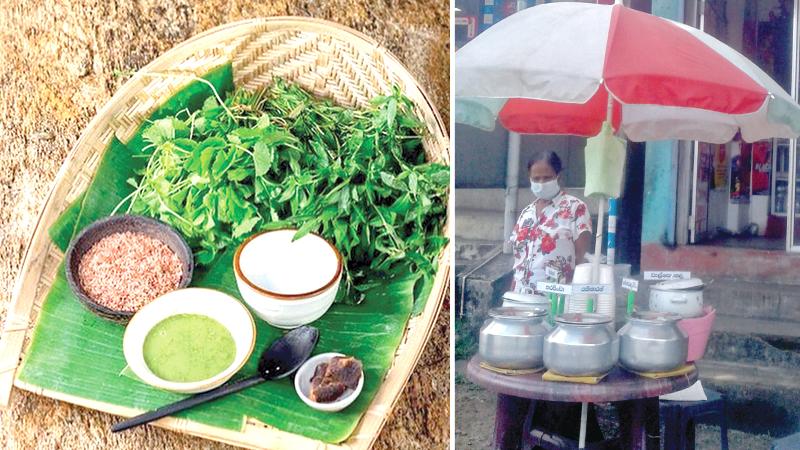
This is part of a series to feature entrepreneurship that is connected with traditional food of Sri Lanka, especially with indigenous medicinal value. This series will feature heritage food entrepreneurship from around the country.
The first story featured is from the Hanwella area.
Every morning in two locations in the Hanwella area two women would rise by 3.00 am and begin what they describe as a humanitarian mission; to prepare Sri Lankan herb based porridge known as Kendha. Used in traditional medicine – (Deshiya Chikitsa – Sinhala Wedakama) for curing many ailments and for boosting immunity, this leaf based porridge is Sri Lanka’s signature medicine in a cup that answers every health issue, as our ancestors knew well.
Potential
 Although the potential of heritage food based entrepreneurship is vast in Sri Lanka, especially in these pandemic times, it remains ad hoc and without systematic patronage by either State or non State entities to encourage rural well being and business acumen as needed in times such as these.
Although the potential of heritage food based entrepreneurship is vast in Sri Lanka, especially in these pandemic times, it remains ad hoc and without systematic patronage by either State or non State entities to encourage rural well being and business acumen as needed in times such as these.
While Hela Bojun is a State endeavor that have given opportunity to rural women in food entrepreneurship there is the need to initiate more village felt schemes that will encourage more rural families taking to becoming health food entrepreneurs.
Yet, even without a wide-scale national plan for such an initiative there are families at district level who on their own volition take on the task of making the lives of people healthier.
Following is the story as told by fifty eight year old D. G. P. Evon who began making kola kendha ten years ago and six months back encouraged her daughter to do the same.
Broth
Today both mother and daughter Nisansala sell their leaf broth in two different locations in the Hanwella area.
Here is the narration as told by Evon on how she started her health entrepreneurship venture and encouraged her daughter to do the same.
“I live in Hanwella and ten years ago one of my uncles got cancer in the intestines and I was looking after him.
I started researching the different types of indigenous medicine related leaves that are good for healing cancer and started giving him Kendha such as those made out of monarakudumbiya, karapincha, gonika and heenbovitiya.
Often there was the porridge that remained and gradually I used to distribute it to the nearby households. Soon people started bringing me certain leaves and asking me to make porridge out if it. They then offered me some money for what I made and soon this became a full-fledged entrepreneurship venture.
Family
Our family owns few commercial properties around the Hanwella and surrounding nearby areas and I placed an overhead canopy and stall in front of such a building and with the utensils needed started the stall to sell around five to six varieties of kendha that included karapincha, gotukola and several other leaves.
A few wedamahattayas known to me also assisted in recommending the different types of kendha that has medicinal value. Soon I was earning close to around Rs. 1000 a day and at present it is almost Rs. 2000 per day.
Accessible
People are more conscious about their health now and we sell a kola kendha cup in disposable material for Rs 60. I can manage to sell these in an enclosed atmosphere of a building as I have few of these buildings but I stand in the side of the road and do this business as it is more people friendly and accessible.
My daughter who is 35 years does not like this much and I had to persuade her to do this business in a separate location but she is a bit fussy about standing near the road and selling kendha. But I always tell her that it is our own business and we are doing a service to the people in educating them on their health. I always advise especially young people what they should eat and drink and on our indigenous food. I am now looking for a good book on medicinal kendha so I could increase my range and also have a better advertising.
I save Rs. 500 or so each day and officers from the Regional Development Bank come to where I am and collect the money. This is how they encourage savings of village based entrepreneurs.
I wish to educate more families to start indigenous health based businesses so that they prevent illnesses in the country.
Every day I feel that I am accruing merit by what I do and saving at least one life from unnecessary illness and even death. I start the stall by 6 am and we have a separate place to make it. We focus on cleanliness a lot and this is appreciated by the people. Around 40 or 50 persons come to our stalls daily.”
